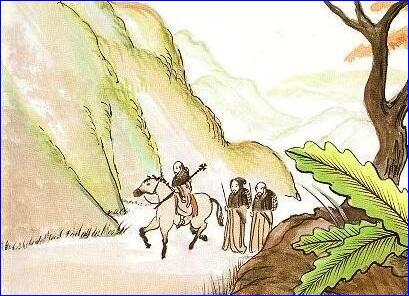


That's why I love the series of articles written by my colleague Dr. Glenn Sunshine at ColsonCenter.org entitled, "Christians Who Changed Their World." But Glenn isn't just focusing on the big names. He introduces us to lesser known but equally significant heroes of the faith. Women like Hannah Moore, and men like Alopen.
That's right, Alopen. In Glenn's latest installment, he writes, "Although it is not very well known, for the first thousand years of church history there were probably more Christians outside of the old boundaries of the Roman Empire than within them. Christianity in India may date back as far as the Apostle Thomas; the first kingdom to convert to Christianity was Armenia...and there were large numbers of Christians in the Persian Empire who spread their faith into Central Asia and beyond via well-established trade routes to China."
One of those Christians was Alopen, a Nestorian [Assyrian] Christian living in central Asia. The Nestorians believed in the full humanity and divinity of Jesus, but disagreed with the specific formulation adopted by the Council of Chalcedon in 451. The Nestorians, or Church of the East, set up churches, schools and monasteries along the major trade routes throughout Persia and central Asia.
In 635--before most of Europe had been evangelized--a group of Nestorian missionaries led by Alopen traveled east to the court of the Chinese Emperor Taizong.daily_commentary_06_05_15
Taizong was a scholar and promoter of religious tolerance. His library is reported to have held 200,000 volumes, rivaling the great library at Alexandria. When the Emperor learned that Christians were people of the book, he asked Alopen to translate the Scriptures into Chinese. We don't have a complete record of Alopen's work, but the first book he translated was the "Sutra of Jesus the Messiah"--a collection of 206 verses that sought to explain Christian beliefs and show how they were compatible with traditional Chinese values.
The Emperor ordered that copies be distributed around the empire. In 638, Taizong granted official tolerance of all religions and gave special protection to the Nestorian church. Further, he built the first Christian church and monastery in China, housing 21 Persian monks.
After Emperor Taizong died, his son continued a policy of religious freedom, but later political turmoil led to the persecution of Nestorian Christians for a time before another Nestorian, a Persian nobleman named Abraham, earned the trust of the bloody Empress Wu. When she saw his loyalty, she relented in her attack on the church.
Safe again from persecution, Nestorian Christians continued to influence Chinese culture and enjoy imperial favor for the next 200 years until the fall of the T'ang Dynasty in 907.
I love this story because it shows what can happen when a faithful Christian answers the call of God. In Alopen's case, God used his zeal and knowledge to open a door with an Emperor who also valued learning. God prepared a way for him to enter China and influence Chinese culture for almost 300 years.
However, Alopen's is just one such story of God utilizing a person's God-given talents and abilities to serve Him in a unique way.

or register to post a comment.